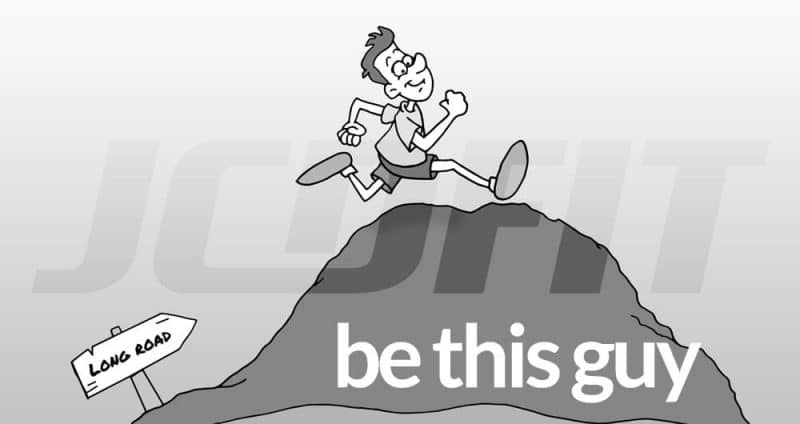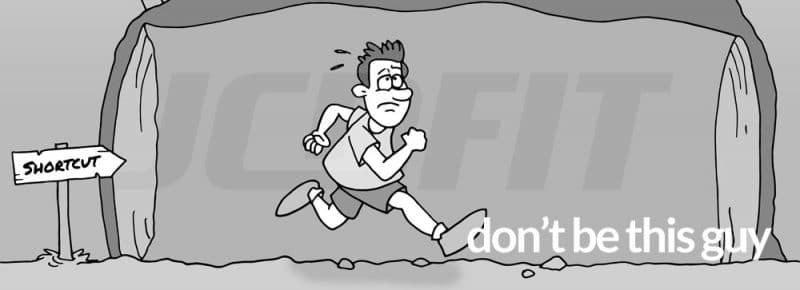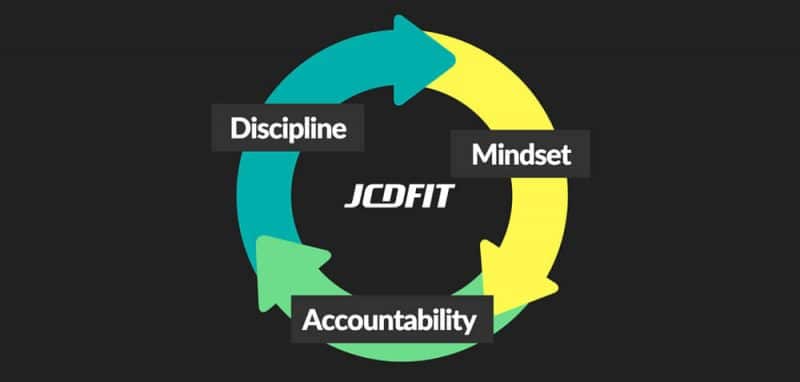The image may not make sense at first glance, but it’s about to become crystal clear.

If you’ve ever struggled with getting results because you’ve tried various bio-hacks, special diets, easy workout plans, or shortcuts of any variety, you’re about to learn the truth.
And Jim said it best:

The Big Problem: Too Much Information.
There’s a claim that we’re exposed to 4,000 pieces of information per day in the form of ads, logos, the written word, and various other digital media.
Even if that estimation is high, just being exposed to a quarter of that is overwhelming to consider.
Gone are the days of going to the library to get our information.
We now live in the so-called ‘Attention Economy’ — with our smartphones, tablets, computers, and digital assistants (Alexa, Siri, Google Home), someone is always competing for our ears and eyeballs.
While I love how much information is at my fingertips, I realize it’s hurting us in ways we probably couldn’t have imagined.
Now, don’t get me wrong. I freakin’ love the Internet.
I remember sitting in my bedroom at 16 learning about blogs, internet forums, Myspace, Facebook and other social media on the freshly built computer I put together with parts sourced from eBay.
And because of this here internet, I was able to build a career.
It’s also allowed me to learn things I’d never have been able to otherwise.
Things like how to edit video and audio, principles of design, even how to write more gooder, thanks to the crazy amount of blogs on writing and tools like Grammarly.
The Internet In Your Pocket + Being Wired For Instant Gratification
Nowadays we can be on the internet, literally, all day long—our entire waking hours can be consumed by regularly checking our phones, tablets, or watching video on our various devices.
Just look at this chart from the average amount of time spent on the internet in an average week in the United States.

What’s this have to do with anything? Everything.
Humans are dopamine-driven beings.
In short, dopamine is a neurotransmitter in the brain — a feel-good chemical that is released as we move toward a reward.
From this source: CogniFit –
Dopamine is the central chemical in your brain that regulates how you perceive and experience pleasure. During pleasurable moments or situations, this neurotransmitter is released, which causes a person to seek out a desirable activity over and over again. Eating (especially foods with high levels of sugar) and having sexual intercourse are stimulants of dopamine being released in the brain. This is the reason why these activities are usually enjoyable and why people continuously engage in them.
Remember this: reward can come from something big or small. But the brain doesn’t distinguish between whether or not the tasks are good for us.
It’s much easier, and more rewarding in the short-term to eat a tub of ice cream than it is to push yourself hard in the gym.
We say we want a six-pack, but in reality, the act of getting a six pack doesn’t feel that great. The rewards aren’t immediate.
I suppose this example would be way different if ice cream hadn’t been commercialized.
And if we wanted to enjoy ice cream, it would mean making it at home.
That would be a lot of work, and the reward would still be there if you went through the process of making it, but it wouldn’t be instant.
At least not in the beginning, especially if you had to start from square one by getting on your hands and knees in the mud to pump those udders for milk into a silver bucket.
Look. I love ice cream… but if I have to pull on some cow tiddies instead of walking over to my freezer, I probably wouldn’t eat much of it.
It’s much easier to derive pleasure in the short term from good food than it is from hard exercise.
Remember, we are pleasure-seeking by default.
Chocolate tastes better than green veggies.
Sugary, salty foods are tasty and fun to eat.
It’s easier to order a pizza and have it hand-delivered to your door than it is to cook a proper meal of meat, potatoes, and well-cooked greens. Some argue it tastes better, too.
Sleeping in feels better than forcing ourselves out of bed to go to work.
It’s easier to skip the gym and forgo the pain of an intense weight training or cardio session.
Instead of working diligently on a single task at work, or reading an exciting book, it’s easier to open your phone and scroll through the endless social feeds that steal your attention.
Opening a new tab to see what’s on YouTube would be much more rewarding than writing this very article, at least in the short-term.
Research shows that it’s in our very instincts as humans to seek novelty, reward, and pleasure despite the long-term consequences being very bad for us.
Little Devils In Our Brain
Here’s the rub from some revealing neuroscience research:
The scientists’ research, spanning almost 30 years, found that dopamine neurons are at the heart of the brain’s reward system, affecting behavior in everything from decision-making, risk-taking and gambling, to drug addiction and schizophrenia.
“This is the biological process that makes us want to buy a bigger car or house, or be promoted at work,” said Schultz, a German-born professor of neuroscience who now works at the University of Cambridge.
He said dopamine neurons are like “like little devils in our brain that drive us towards more rewards”.
But there is a key to going beyond our natural hedonistic tendencies. And it’s a combination of understanding your pain and your commitment to a particular outcome or reward, or process.
More on this at the end of this article.
But before I cover that, I want to make you aware of something that is (likely) murdering your potential for progress.
And it’s not entirely your fault*.
*I had to get that out of the way, but even if it’s not entirely your fault, you’re still responsible for what you do with this message and your time, okay pumpkin?
The fault is equally between your biological tendencies to seek pleasure and the environment that influences you.
You already know that you’re wired to seek pleasure. After all, you’re a knuckle-dragging ape with clean clothes and a smartphone. I said it. I’m just a messenger. But here’s how outside influence plays on your tendency to seek rewards.
Let’s talk about hacks and shortcuts.
How Hacks Destroy Your Ability To Get The Results You Want
If you’re reading this, you’re using the internet. And if you’re using the internet, you’ve likely seen similar headlines:
Get Rock-Hard Abs In 21 Days
Torch 20 Pounds Of Fat With These 3 Fat-Burning Foods
Calories Don’t Count: How To Lose Fat With The Keto Diet
How I Work 22 Hour Days With A Miracle Drug (And Rarely Need To Sleep)
Make A Million Dollars Next Month Without Buying Ads, Having an Email List, Selling any Products, or Getting Out of Bed!
Surely you get my point. If you don’t, cease whatever else you’re doing that’s distracting you and go back to the beginning.
All of the headlines above have a significant promise, but they’re baseless and most destructive when you look at how they divert your attention from the hard work (which is the only thing that produces results).
I understand why the culture of hacking is so big now. One shortcut that particularly stands out is the so-called BioHacking movement.
Want to get more done?
Easy, sleep less. Never mind the fact that our bodies need a solid 7-9 hours of sleep per night to function optimally.
By the way, this is not up for debate. If you care at all about your physical and mental performance, you need consistent, restful sleep. Don’t @ me.
–
Want to build muscle faster?
Simple — take this mass gainer shake. Never mind that it’s full of cheap ingredients that are bad for your health. And that real food like meat and potatoes costs less AND has more nutritional value.
–
Want to lose fat fast?
Great — forget counting calories. Forget exercising. Forget even thinking about fat loss ever again. Just take this bottle of pills, and you’ll be slim in no time.
—
All of this is pure nonsense. I know this. You know this. I know that you know this.
But the supplement industry rakes in billions of dollars every year. And it’s growing.
All these articles about how to ‘hack your biology’ get spread far and wide, but you simply cannot replace time, effort, education, and hard work with a few simple hacks.
But look. I get it.
Our lives are short in comparison to the grand scheme of how big and old the universe is.
We are nothing but tiny, insignificant bacteria atop this giant rock hurtling through space.
Don’t believe me? Just look at this pic of Nicolas Cage.

It’s in our DNA to seek out the path of least resistance — the one that promises the shortcut. But no one made significant progress by avoiding the hard work.
Health And Exercise Hacks Set You Back
It’s simple.
We all have the same amount of time as everyone else.
How we use that time is what determines our outcomes.
To get to the brass tacks, look at it like this:
Let’s say you have a goal of squatting double your body weight for five reps.
If you spent an entire year squatting three days per week with a good program, you would be much closer to your goal at the end of the year than if you didn’t put in that work.
But here’s the catch.
Intuitively, you know that it’s going to take a lot of hard work.
Some days you’ll go to the gym, and you might not feel like working out.
Some days you’re going to be sore.
Some days you’re not going to be as strong.
And in a moment of weakness, you might search for more comfortable ways to squat twice your body weight without having to work so hard.
Maybe you’re on the wrong program. Maybe you’re training too much or too little?
And here come the promises of shortcuts.
So you try out a new program for a few weeks, but you get distracted again.
You read that instead of training your lower body three days per week, you should squat daily. That’s what the Olympic Weightlifters do.
After a week of lifting, you’re so sore you can’t walk.
You start looking for another hack.
Six months go by, and you realize you’ve not made much progress.
By trying to figure out a shortcut, you delayed your progress. You avoided the hard work.

If you only added 20 pounds to your squat in that six months, it would’ve been more fruitful than changing programs all the time and not making any gains.
For instance, I will never be mad that I’ve spent over ten years under the bar pushing my body in the gym.
Could I have done things differently? Sure. Could I have avoided some injuries? Possibly.
But the time and consistency matter way more than any single particular program, rep scheme, or diet I was following.
My body is a product of years of time under tension, not a 12-Week Hybrid Radical Hypertrophy Program that I did haphazardly whenever I felt like it.
The Long Road Is The Short Road

This guy is taking the long road.
It takes way more effort to run up the hills and over the rough terrain.

This guy is taking the short road. In his mind, he will be further ahead of the guy taking the long road.
But what he doesn’t realize is that he won’t receive the same benefits from the shortcut, even though he’s supposedly saving time.
In fact, when he comes out the other end, he’ll be waiting for the other guy to finish with the long road.
But once he meets him, he’ll see the fruits of the Long Road Guy’s hard work and effort.
Long Road Guy will sport a slimmer, more defined body.
He’ll have more muscle.
More strength in his quads and hips from running up and down the hills.
He’ll have a higher capacity to sustain intense exercise over a longer period.
He’ll have built resilience from dealing with the hard work and not opting for the easier route like Short Road Guy.
His ability to be disciplined in other tasks will heighten as a result of sticking with the hard work of intense physical training.
And once Short Road Guy sees that his shortcut didn’t pay off, he’ll realize that it’s going to take him even longer to reach his goals than if he’d just stuck with the long road.
The Lond Road Is The Short Road.
It’s Not Easy, But It’s Worth It
The time spent running up and down the hill will take way longer than running through it. The same goes for weight training and building your body.
The influencer on Instagram didn’t build their bulging biceps and six-pack abs by taking a pre-workout supplement.
They’ve invested years and years of sweat equity at the gym. They;ve eaten loads of food to make their muscles grow.
They’ve dealt with the pain of lactate building up in their quads and glutes during those 20-rep squat workouts.
They’ve dealt with the psychological pain of feeling inadequate about their physique, which was the genesis of the entire journey.
And truth told… they might even be on steroids while claiming Natty™ in their profile.
So take the long road because it’s the shortest path possible to the results you’re wanting.
How To Choose The Long-term Gains Over Short-term Pleasure
First of all, you have to know what you want.
Want to be stronger? Leaner? Have a six-pack? Want to wear a bathing suit with confidence?
Whatever it is – you have to know exactly what the goal is.
Then you must get clear on ONE thing…
How painful will it be if you don’t follow through on your goals?
This is a question I ask all of my coaching clients. How much is it going to suck if you don’t follow through?
It sucks that we have a stronger desire to move away from pain rather than toward a positive goal, but that seems to be the way most of us are wired.
So here’s how you do it, in short.
It comes down to three principles:
- Discipline (to stick to your goals)
- Mindset (how to view the process in a way that serves you)
- Accountability (it’s so much easier to reach your goals when you have to answer to someone else)

If you have a specific goal to change your body, you must make it a priority and develop the discipline to build the habits necessary that will move you toward that goal.
I cover exactly how to do this in my health habits guide.
The mindset is all about learning to deal with the negative voices in your head that sabotage you along the way.
The voices that say “you’re not good enough” and that “you don’t deserve to lose weight and feel better.”
We all deal with that, but we don’t have to give in to the negative self-talk.
What we can do is learn to change our thoughts and beliefs by creating good habits, tracking progress, and focusing on the process of doing the daily work instead of fixating on the end-goal.
And lastly, accountability is a huge piece of the puzzle because, without accountability, most people won’t do what they said they would do.
It’s easy to say “I’m going to lose 20 pounds” but how do you keep yourself focused?
Most people aren’t able to follow through on their own, but with some help and encouragement from others, they’re able to thrive.
If you want to tackle these mental blocks and get out of the ‘health and fitness hacks‘ mindset, pick up a copy of my book: Stay Leaner, Longer.
